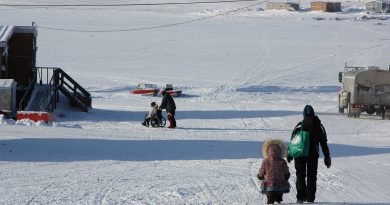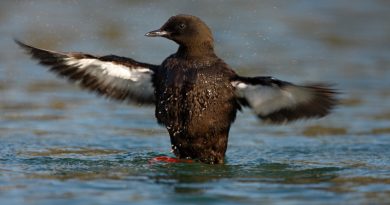Putin promotes NSR at Russian Arctic conference
For the second year in a row, the Russian Geographical Society has organized the International Arctic Forum. While last year’s forum took place in the capital, Moscow, this year’s forum, “The Arctic – Territory of Dialogue,” has moved farther north to Arkhanghelsk, Russia – a city Putin deemed in his speech “the ancient capital of the Russian North and the homeland of Arctic trailblazers.”
The forum took place from September 21-24. The main theme is development of the infrastructure and transportation network of the Arctic, with secondary themes being search and rescue operations and environmental safety. The conference is a major event in Arctic affairs, since as last year, several heads of state and Arctic officials will be in attendance. RIA Novosti reports that “Russian Prime Minister Vladimir Putin, Prince Albert II of Monaco, Iceland’s President Olafur Grimsson, Canada’s senior Arctic official and head of the Arctic Council Sheila Riordon, [and] French ambassador to Russia Jean de Gliniasty” are expected to attend.
Putin’s speech
Putin gave a particularly impressive speech at the forum given that it is rare to see a world leader, even one from the Arctic, give such a lengthy and detailed talk about the Arctic. Echoing the theme of the forum, the main topic of his speech was the Northern Sea Route (NSR). He said of the route,
“We are planning to turn it into a key commercial route of global importance. I’d like to emphasise that we see its future as an international transport artery capable of competing with traditional sea routes in cost of services, safety and quality.”
He then went through the usual statistics describing the benefits of the NSR over more traditional shipping routes, namely its shorter distance. Yet more interestingly, he stated,
“I think that transportation – new sea and air corridors – can become one of the breakthrough projects uniting Arctic nations.”
Considering the Northern Sea Route
Russian rhetoric on the Arctic tends to go back and forth between being staunchly territorial and idealistically cooperative. Transportation in the Arctic is a funny thing, since while it does have the capability to technically link countries, the NSR constitutes internal waters, while Canada claims that the Northwest Passage does, too. If a shipping lane falls within internal waters, then a country can enforce its own rules and regulations. For instance, Putin announced that Russia is drafting a law that will regulate all activities along the NSR, which the Duma will likely pass in the next month or so. In a separate speech, Russian Transportation Minister Igor Levitin said,
“I would like to ask you both to see to it that the law is passed during the fall parliamentary session, thus creating a legal framework for the Northern Sea Route operation beginning in 2012.”
While successful operation of the NSR depends on having a workable legal framework, it also depends on having the necessary infrastructure in place. Putin mentioned that the existing Port of Varandei near the Yugorsky Shar Strait will be upgraded, while the new Sabetta Port will be constructed on the Yamal Peninsula to support the new LNG project there.
Bolstering infrastructure
Additional elements of Russia’s Arctic infrastructure, such as “river, car and railway routes and communications, northern airfields, airports and polar aviation,” will also be upgraded. More investments will be funneled into the development of Russian satellite and GPS systems as well. Should all of these upgrades really take place, it could possibly widen the gap between the strong infrastructure in place around projects often funded by foreign investment, such as oil and gas developments, and the rest of Russia. This blog post from the Russia Monitor insightfully explains many of the problems with Russian infrastructure, like a propensity for the government to throw money at problems instead of actually conceiving a long-term plan. But in the Arctic, it sounds like a more comprehensive plan is being made. One development that could benefit both local people and foreign investors is polar aviation. Already one of the main ways people get around the Canadian Arctic, it could also take off in the much larger Russian North.
Russia’s long-term attitude towards infrastructure development in the Arctic also, at least in words, carries over to its view of the region’s environmental situation. Though some of the oil and gas deposits in Russia are expected to last for at least several decades, Putin averred, “Active economic development of the Arctic will be beneficial only if we maintain a rational balance between economic interests and environmental protection for the long term, not just for 10, 15 or 20 years.” The government is already starting to clean up the mess on Franz Josef Land and will soon do so on Wrangel Island and in the old Russian villages on Spitsbergen. On a visit to Wrangel Island, as I mentioned a few months ago, Putin was “terrified of the number of barrels.” It’s both a good and bad sign that Russia’s pollution in the Arctic is scary enough to push a bear-wrestling, tiger-tranquilizing man into trying to clean it up.




